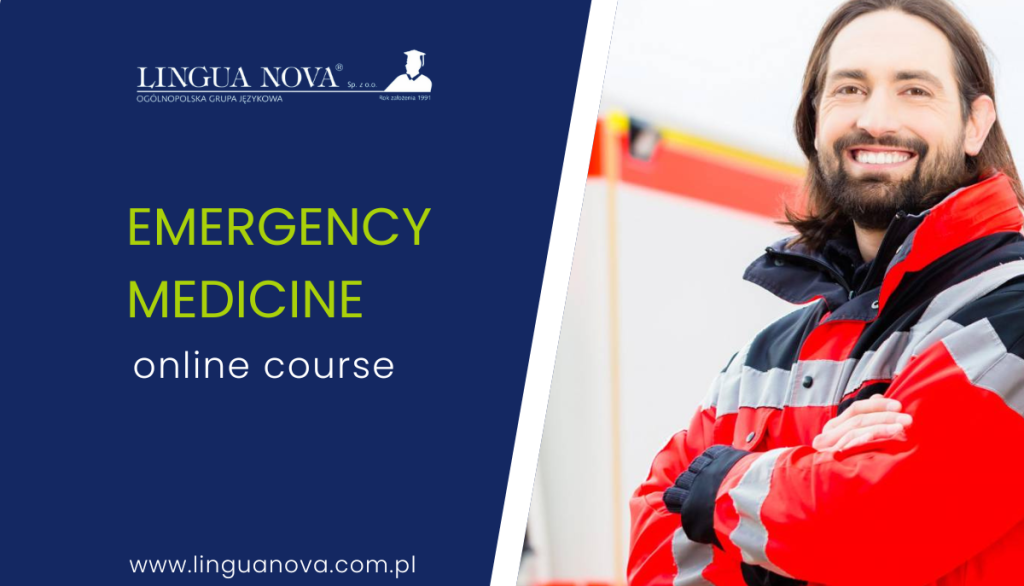Emergency Medicine in English – Why Is Knowing Specialized Vocabulary Important?
Emergency medicine, often referred to as Emergency Medical Services (EMS) or Paramedics, is a crucial component of healthcare systems worldwide. In high-pressure, fast-paced scenarios where every second matters, the ability to communicate effectively in English can be life-saving. As modern medicine increasingly crosses national borders, Polish emergency medical professionals participate in international missions, collaborate with foreign teams, and assist international visitors in Poland.
In this article, we will delve into the concept of emergency medicine in English, highlight the importance of specialized medical vocabulary, and introduce the course offered by Lingua Nova. Moreover, you’ll discover the topics covered in the training, identify who can benefit from it, and explore key terms vital for effective communication in international medical contexts.
What Is Emergency Medicine?
With globalization and more frequent instances requiring cross-border collaboration, English has become an essential tool in emergency medicine. Such situations include:
- Assisting international visitors in Poland who require urgent intervention.
- Participating in international medical missions, for example, during natural disasters or mass-casualty incidents.
- Collaborating with foreign emergency medical teams.
- Attending trainings or conferences where English is the primary language of communication.
Additionally, knowing specialized terminology like Cardiopulmonary Resuscitation (CPR) or Automated External Defibrillator (AED) significantly enhances job efficiency and ensures better understanding of medical procedures.
The “Emergency Medicine in English” Course at Lingua Nova
Responding to the increasing demand for specialized language training, Lingua Nova has designed a course titled Emergency Medicine in English. This unique offering is ideal for individuals who want to expand their language skills in the field of emergency medicine. Furthermore, the course is an excellent solution for medical and educational institutions seeking to enhance their staff’s or students’ language competencies in emergency medical care. Through this program, participants gain not only theoretical knowledge but also practical language skills essential for professional communication in international settings.
To get started, simply visit our platform:
eschool.linguanova.com.pl
For more information, feel free to contact us:
kursy@linguanova.com.pl
+48 503 196 762
How Does the Emergency Medicine in English Course Work?
The online course is designed to help participants acquire essential language skills in a straightforward and effective way. It consists of:
- Thematic modules that combine theory with practice.
- Theoretical content, including specialized vocabulary and procedure descriptions.
- Practical exercises to reinforce the material.
- Glossaries explaining complex terms in both English and Polish.
- A final test to assess the knowledge gained.
Course Topics
Each module covers key topics in emergency medicine, including:
- Job Description for Paramedics – Understanding the paramedic’s role.
- Road Traffic Accidents – Handling vehicle-related emergencies.
- Cardiopulmonary Emergencies – Addressing heart and lung crises.
- Neurological Emergencies – Managing brain and nervous system issues.
- Diabetic Emergencies – Responding to diabetes-related crises.
- Pediatric Emergencies – Treating medical issues in children.
- Gynecological Emergencies – Handling gynecological conditions.
- Mass-Casualty Incidents – Responding to large-scale emergencies.
Emergency Medicine in English – Essential Terms
Basic Terms
- Emergency Medicine – Medical discipline focused on urgent care.
- Emergency Medical Services (EMS) – System providing pre-hospital care.
- Emergency Medical Team (EMT) – Team handling medical emergencies.
- Basic Life Support (BLS) Team – Providers of non-invasive emergency care.
- Advanced Life Support (ALS) Team – Specialists offering advanced emergency interventions.
- Emergency Dispatcher – Professional coordinating emergency responses.
- Ambulance – Vehicle for patient transport.
- Helicopter Emergency Medical Services (HEMS) – Airborne emergency medical assistance.
Patient Conditions and Procedures
- Life-threatening Condition – A critical situation endangering life.
- Sudden Cardiac Arrest (SCA) – Abrupt cessation of heart function.
- Cardiopulmonary Resuscitation (CPR) – Life-saving procedure for cardiac emergencies.
- Defibrillator – Device delivering electric shocks to restore heart rhythm.
- Automated External Defibrillator (AED) – Portable defibrillator for public use.
- Intubation – Insertion of a tube into the airway.
- Mechanical Ventilation – Machine-assisted breathing.
- Poisoning – Exposure to harmful substances.
- Shock – Life-threatening reduction in blood flow.
- Loss of Consciousness – State of being unresponsive.
- Hemorrhage – Excessive bleeding.
Medical Equipment
- Stretcher – Equipment for patient transport.
- Cervical Collar – Support for neck injuries.
- Spinal Board – Device for spinal immobilization.
- Resuscitation Kit – Essential tools for life-saving procedures.
- Pulse Oximeter – Device measuring blood oxygen levels.
- Electrocardiograph (ECG) – Machine for heart monitoring.
- Emergency Medications – Drugs for urgent medical treatment.
- Infusion Kit – Equipment for administering fluids.
Transport and Hospitals
- Medical Transport – Moving patients to care facilities.
- Handover of the Patient – Transition of patient care between teams.
- Emergency Department (ED) – Hospital area for urgent cases.
- Intensive Care Unit (ICU) – Unit for critically ill patients.
Other Terms
- Scene of the Incident – Location of the emergency.
- Triage – Prioritization of care based on urgency.
- Casualty – Individual affected by an incident.
- First Aid – Initial care provided to patients.
- Medical Evacuation (MedEvac) – Transportation to a safe location.
- Mass Casualty Incident (MCI) – Event causing multiple injuries.
Take your professional skills to the next level by exploring emergency medicine in English today: eschool.linguanova.com.pl
Other Medical Courses Available on Our Platform:
Lingua Nova
Wspólna 41, 00-519 Warszawa
https://agencjatlumaczen.com.pl ;
kursy@linguanova.com.pl
tel. 22 5841010 lub 668 041 729

Skontaktuj się z nami
Wspólna 41/2p, 00–519 Warszawa
